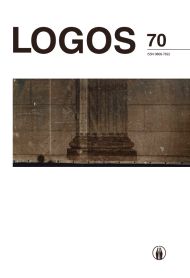Akivaizdumas Kaip Tikrovės Pažinimo Principas: Filosofijos, Logikos Ir Dykumos Tėvų Takoskyra?
Evidence as a Principle of Knowledge: Divide of Philosophy, Logic and Desert Fathers
Author(s): Arūnas BingelisSubject(s): Metaphysics, Epistemology, Logic, Philosophy of Religion, Philosophy of Science, Phenomenology
Published by: Visuomeninė organizacija »LOGOS«
Keywords: evidence; reality; mind; experience; unconditioned; phenomenology; logic; Desert Fathers;
Summary/Abstract: In both philosophy and science when searching for correspondence between experience and thinking of reality a principle of evidence is employed. I’m interested in possible correlations of the mentioned principle of evidence with another field of its particular validity – a phenomenon of religious experience of ascetics in early Christianity and contemporary successors of tradition. A phenomenologist who invites to return to “the things themselves”, seeks eidetic vision, non-mediated experience and its adequate expression should recognize reality itself as an evident imperative in wasteland. A thirst for evidence which accompanies the Desert Fathers is slaked in a qualitatively different way than in science or philosophy. Here evidence as an attribute and principle of experience and true knowledge is obtained as a Gift of transcendence, although existential decision is a necessary condition in order to accept it. Such experience of the hermits being in the proximity of that which is unconditionally real is witnessed by the pearls of Desert wisdom – apophthegms.
Journal: LOGOS - A Journal of Religion, Philosophy, Comparative Cultural Studies and Art
- Issue Year: 2012
- Issue No: 70
- Page Range: 26-37
- Page Count: 12
- Language: Lithuanian

